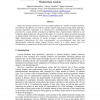Free Online Productivity Tools
i2Speak
i2Symbol
i2OCR
iTex2Img
iWeb2Print
iWeb2Shot
i2Type
iPdf2Split
iPdf2Merge
i2Bopomofo
i2Arabic
i2Style
i2Image
i2PDF
iLatex2Rtf
Sci2ools
102
click to vote
CBMS
2005
IEEE
2005
IEEE
Local Dimensionality Reduction within Natural Clusters for Medical Data Analysis
Inductive learning systems have been successfully applied in a number of medical domains. Nevertheless, the effective use of these systems requires data preprocessing before applying a learning algorithm. Especially it is important for multidimensional heterogeneous data, presented by a large number of features of different types. Dimensionality reduction is one commonly applied approach. The goal of this paper is to study the impact of natural clustering on dimensionality reduction for classification. We compare several data mining strategies that apply dimensionality reduction by means of feature extraction or feature selection for subsequent classification. We show experimentally on microbiological data that local dimensionality reduction within natural clusters results in a better feature space for classification in comparison with the global search in terms of generalization accuracy.
CBMS 2005 | Dimensionality Reduction | Local Dimensionality Reduction | Medical Imaging | Multidimensional Heterogeneous Data |
Related Content
| Added | 13 Oct 2010 |
| Updated | 13 Oct 2010 |
| Type | Conference |
| Year | 2005 |
| Where | CBMS |
| Authors | Mykola Pechenizkiy, Alexey Tsymbal, Seppo Puuronen |
Comments (0)

